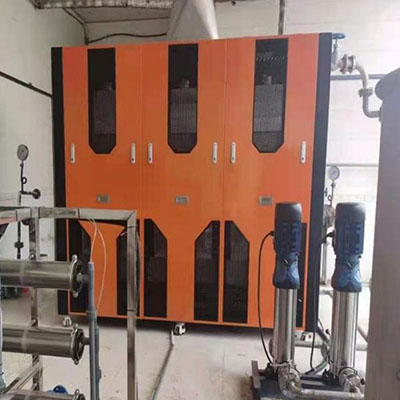What is the difference between industrial (pressure) boilers and steam generators? Boilers generate steam by heating water in pressure vessels and generating molecules. When water boils at the boiling point (the boiling temperature depends on the pressure generated), steam is obtained at saturation pressure. This type of steam manufacturing represents older steam technologies (as Tsat and Psat ripening are linked to produce steam at temperatures different from atmospheric pressure). On the other hand, steam generators are modern equipment with instant switching functions, steam speed control functions, independent back pressure control, and significant high-temperature steam capabilities (pressure vessels that do not require back pressure or pressure).
The saturated steam generated by traditional boilers can sometimes be slightly overheated. Therefore, boiler steam may be wet and contain water droplets. For example, a boiler requires 10 bars, and the saturation temperature is only 180 ° C - even at 100 bars, the saturation temperature is only 311 ° C. Steam generators do not need to operate at high temperatures and pressures, so they typically provide high-temperature dry steam.
The steam generator can operate at room temperature. Therefore, high temperatures can be achieved in steam without the need for clumsy pressure. Obtain high temperatures up to 1000 ° C.

Industrial boilers operate well, but they are inefficient 19th and 20th century technology machines. In many configurations (only in stable states, boilers typically require a long time), their efficiency can reach 85%, but they still have significant deficiencies in temperature capacity. For boilers, efficiency typically decreases as the rated pressure increases. GHGA, MHGA, OAB, or HGA type steam generators can usually provide over 95% efficiency even at temperatures of 1000 ° C or higher (unimaginable temperatures for boiler steam).
Temperature limit - Industrial boilers are subject to pressure limiting temperature. In order to obtain higher temperatures, higher pressure is required. The steam generator is not like this.
In order to operate at temperatures below the rated temperature, boilers typically sacrifice efficiency or safety. The steam generator is not like this. As the rated pressure of the boiler increases, its efficiency usually decreases.
Combustion process - Almost all large industrial boilers utilize the combustion process. This leads to the generation of CO2 and NO X, as well as the consumption of fossil fuels. The combustion process usually leads to low efficiency and high energy loss.
Safety - Pressure vessels may malfunction and explode (although this is rare as many boiler manufacturers follow good practices). Low water level can cause the boiler to overheat and potentially explode. Gas leakage poses both inhalation and explosion hazards.
Certification - Any boiler or pressure vessel requires certification and inspection. Check the boiler regulations in your region.
Boilers are difficult to use - the operation of boilers usually depends on trained specific personnel who should be trained to read the dial and take various safety measures in accordance with local regulations. Boilers are very complex.
 中文版
中文版






